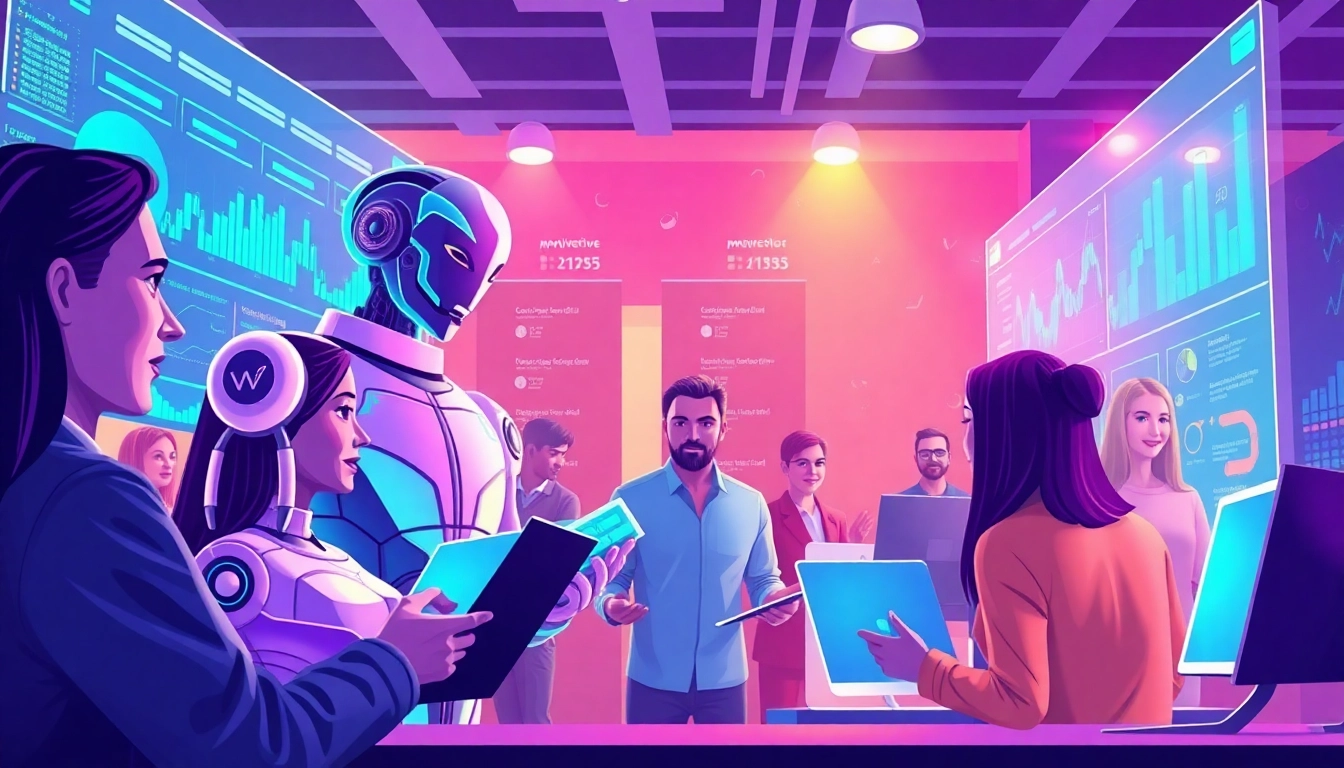Understanding AI Marketing Agents
Definition and Functionality
AI marketing agents are sophisticated software systems that integrate artificial intelligence to perform a variety of marketing tasks. These autonomous agents can analyze data, generate personalized content, automate repetitive tasks, and enhance customer interactions. Unlike traditional tools that require manual input, AI marketing agents leverage algorithms to learn from large sets of data and adapt their strategies based on real-time insights.
Essentially, these agents can function across multiple marketing channels, including social media, email marketing, and website management, improving efficiencies and reducing the workload for marketers. Whether it’s optimizing ad spend or segmenting target audiences, AI marketing agents provide invaluable support in today’s data-driven marketing landscape.
Key Benefits for Businesses
The implementation of AI marketing agents presents numerous benefits for businesses, ensuring a competitive edge in an increasingly digital marketplace:
- Increased Efficiency: By automating repetitive tasks such as data entry, reporting, and content distribution, AI agents allow marketing teams to focus on strategy and creative initiatives.
- Enhanced Personalization: AI agents analyze consumer behavior and preferences, enabling businesses to craft personalized marketing messages that resonate with individual customers.
- Data-Driven Insights: These agents utilize advanced analytics to draw insights from vast amounts of data, guiding more informed decision-making processes.
- Cost Savings: Reducing the need for human intervention in low-level tasks can lead to significant cost savings, allowing teams to allocate resources more effectively.
- Scalability: As businesses grow, AI marketing agents can easily adapt to increasing data loads and marketing activities, providing a flexible solution to meet expanding needs.
The Evolution of AI Agents in Marketing
The concept of AI marketing agents is not entirely new; however, their evolution has been rapid due to advances in machine learning, natural language processing, and data analytics. Initially used for basic tasks like customer segmentation, these agents now perform complex functions such as predictive analytics and sentiment analysis, making them pivotal in modern marketing strategies.
Moreover, the development of generative AI technologies has led to the creation of content in various formats, including text, images, and videos, allowing brands to streamline their content creation processes further. Looking ahead, continuous improvements in artificial intelligence promise even more sophisticated capabilities for these agents, making it essential for businesses to stay informed about the latest trends and tools.
Implementation of AI Marketing Agents
Choosing the Right Tools for Your Needs
Selecting the right AI marketing agent involves understanding your specific marketing objectives and identifying tools that align with those goals. The market for AI marketing technology is vast, with choices ranging from AI-driven email marketing platforms to sophisticated customer relationship management (CRM) systems infused with AI capabilities.
Factors to consider include:
- Integration: Ensure that the AI marketing tools you select can seamlessly integrate with your existing systems, such as CRM, eCommerce platforms, and analytics tools.
- User-Friendliness: Opt for platforms with intuitive interfaces that your team can navigate easily without extensive training.
- Scalability: The chosen solution should be able to grow alongside your business, accommodating increased data and expanding marketing needs.
- Support and Resources: Look for vendors offering comprehensive support, educational resources, and community forums.
Integrating Agents into Existing Workflows
Once you’ve selected the right AI marketing agents, integrating them into existing workflows is the next crucial step. This process often begins with pilot testing in smaller projects to assess effectiveness and fine-tune configurations. During this phase, establish clear objectives for what you wish to achieve with your AI agents.
Some strategies for effective integration include:
- Cross-Department Collaboration: Foster communication between marketing, IT, and other departments to ensure everyone understands the goals and functionality of the AI tools.
- Training and Education: Provide training sessions for your team to familiarize them with new technologies, helping them to utilize the tools effectively and efficiently.
- Feedback Mechanisms: Implement feedback loops to gather insights from users about challenges encountered and successful outcomes, enabling continuous improvement.
Case Studies of Successful Implementations
Examining real-world examples provides valuable insights into the successful deployment of AI marketing agents. For instance, a leading eCommerce platform implemented an AI-driven recommendation engine that analyzed customer behavior and provided personalized product suggestions. As a result, the company reported a 30% increase in conversion rates and a significant uplift in the average order value.
Another example is a financial services firm that adopted AI chatbots to handle customer inquiries. This automation improved response times from hours to minutes, enhancing customer satisfaction and freeing up human agents to address more complex issues.
Common Challenges and Solutions
Addressing Data Privacy Concerns
As businesses increasingly rely on AI marketing agents, data privacy becomes a pressing concern. The collection and processing of consumer data must comply with regulations such as GDPR and CCPA, which can be daunting for many organizations.
To mitigate these concerns:
- Implement Strong Data Governance Policies: Establish clear guidelines for data usage, collection, and storage to enhance transparency and accountability.
- Utilize Anonymization Techniques: Use data anonymization to protect individual identities while still deriving insights for marketing strategies.
- Regular Training on Compliance: Train your team on compliance issues and best practices, ensuring they are aware of legal implications while handling data.
Managing Change Within Teams
The introduction of AI marketing agents can lead to resistance among team members, particularly those concerned about job security or who may feel overwhelmed by new technologies. Change management is therefore crucial for successful implementation.
Consider these strategies:
- Clear Communication: Maintain open channels of communication, explaining how AI tools will improve workflows and enhance team capabilities.
- Encourage Participation: Involve team members in discussions about AI technologies to empower them and make them feel valued in the transition process.
- Celebrate Wins: Highlight early successes with AI agents to create a positive perception and encourage broader acceptance within the team.
Overcoming Technical Limitations
Technical challenges, such as integration issues, software compatibility, or inadequate data quality, can hinder effective AI agent deployment. Addressing these limitations ahead of time is crucial for a seamless transition.
Here are some solutions:
- Thorough Testing: Before full-scale implementation, conduct rigorous testing to identify technical issues and resolve them preemptively.
- Enhance Data Quality: Ensure that your databases are clean, complete, and well-structured to facilitate accurate AI analysis.
- Maintenance and Upgrades: Regularly update software and tools to maintain compatibility with existing systems and leverage the latest innovations in AI.
Performance Measurement and Analytics
Key Performance Indicators to Track
Measuring the performance of AI marketing agents is essential to understanding their effectiveness and ROI. Key performance indicators (KPIs) vary based on the specific tasks performed by the agents but often include:
- Conversion Rates: Track changes in conversion rates to assess the impact of personalized recommendations or targeted campaigns driven by AI.
- Customer Engagement Metrics: Monitor metrics like click-through rates, open rates, and social media interactions to gauge engagement levels.
- Cost Savings: Evaluate the cost-efficiency of your AI agents by comparing how much time and money they save versus traditional methods.
- Customer Satisfaction Scores: Use customer feedback and satisfaction surveys to assess how AI implementations are affecting user experience.
Benefits of Real-time Analytics
One of the most significant advantages of AI marketing agents is their ability to provide real-time analytics. This capability allows businesses to respond quickly to changes in consumer behavior and market conditions. Key benefits include:
- Immediate Feedback: Real-time insights enable marketers to monitor campaign performance and make instant adjustments as necessary.
- Enhanced Decision-Making: Access to live data allows for data-driven decision-making, minimizing reliance on outdated reporting methods.
- Agility: Organizations can pivot their strategies quickly based on what the data indicates, capitalizing on emerging trends or shifting customer interests.
Adjusting Strategies Based on Data Insights
To maximize the effectiveness of AI marketing agents, businesses must be willing to adjust strategies based on the insights provided. This entails a culture of adaptability, where feedback is not only collected but acted upon. Here are some actionable steps:
- Regular Review Sessions: Schedule consistent meetings to review performance data and strategize revisions based on findings.
- Test and Learn Approach: Adopt a testing mindset, where various campaign variations are analyzed, enabling teams to discover what works best for their audience.
- Iterate Marketing Efforts: Use the insights from AI agents to refine marketing messages, targeting, and overall strategies continuously.
The Future of AI Marketing Agents
Emerging Trends to Watch
As technology evolves, several emerging trends are shaping the future of AI marketing agents. Companies must stay ahead of these trends to leverage new opportunities:
- Increased Personalization: As AI agents become more sophisticated, they will be able to deliver even deeper levels of personalization, enhancing consumer experiences significantly.
- AI-Driven Content Creation: Tools that automate content generation will continue to evolve, allowing companies to maintain a robust content strategy with minimal human intervention.
- Voice and Visual Search Integration: As voice and visual search technologies become more prevalent, AI agents will adapt to these methods to improve search engine visibility and consumer interaction.
Potential Transformations in Marketing Strategies
The integration of AI marketing agents is set to transform marketing strategies fundamentally. With their ability to analyze complex data sets and respond to fast-changing environments, businesses can expect:
- Shift to Predictive Analytics: Future strategies will increasingly rely on predictive models that enable businesses to forecast consumer behavior and adapt marketing efforts accordingly.
- AI as a Creative Partner: AI tools will not only handle analytics but will also play a role in creative tasks, generating unique content ideas and designs.
- Holistic Marketing Approaches: Through the combination of multiple digital channels, AI agents will foster seamless consumer experiences, integrating marketing strategies across platforms.
Preparing Your Business for AI Integration
To successfully integrate AI marketing agents, businesses must prepare adequately. Steps include:
- Education and Training: Equip your team with the necessary skills and knowledge to work alongside AI technologies effectively.
- Infrastructure Upgrade: Ensure your technical infrastructure is robust enough to support AI implementation, including secure servers and advanced data analytics tools.
- Fostering a Data Culture: Promote a culture of data-driven decision-making within your organization, encouraging team members to utilize insights garnered from AI agents in their strategies.



